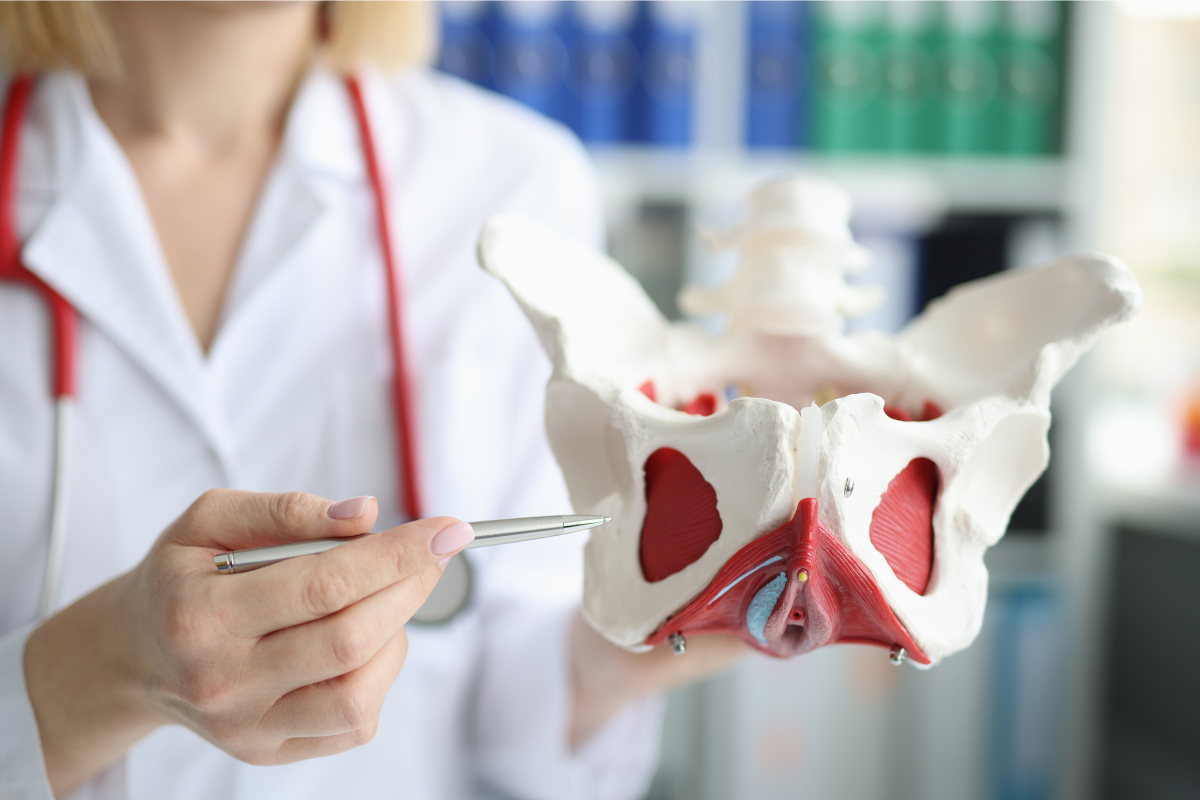Feeling Bloated? You’re Not Alone

The sensation of uncomfortable tightness in your midsection or the need to loosen your pants can be classified as bloating or gastrointestinal (GI) discomfort.
Bloating is a common symptom of perimenopause and postmenopause and it can worsen with age. The good news is that you can reduce bloating by adjusting your lifestyle.
Causes of Abdominal Bloating
These are some common causes of bloating:
- Gas enters our bodies when we swallow air and is also created in the intestines when gut bacteria ferment the fiber we eat.
- Constipation occurs when infrequent bowel movements leave our intestines more full of stool.
- Water retention occurs when certain types of foods draw extra water into the intestines.
- Stress and anxiety can trigger bloating by altering your gut bacteria to change both your eating pattern and digestive speed.
Some degree of bloating is natural and unavoidable. For example, fiber is essential to maintaining a healthy immune system, so some gas produced by our gut bacteria is actually a good sign.
Women are more likely to experience bloating than men for a few reasons:
- Women tend to have longer colons than men do.
- Menstrual cycles and fluctuations during perimenopause can make digestion more variable because hormone changes affect the speed at which food moves through the GI tract.
- Women may have more visceral sensitivity than men do, which means women may have a lower threshold for discomfort in their GI organs.
Sometimes bloating can go beyond discomfort and be classified as Irritable Bowel Syndrome (IBS). IBS is diagnosed when you have more than one of these symptoms for at least three months:
- Cramping & abdominal plain
- Abdominal bloating
- Diarrhea
- Constipation
IBS affects 10-15% of the Western population. Women appear to be at least twice as likely to have IBS than men.
IBS is not curable, but many people find relief through diet and stress management.
Note: In some cases, abdominal bloating is a sign of a more serious medical issue like celiac disease, inflammatory bowel disease, pancreatic issues or bacterial overgrowth. Please check in with your healthcare provider if your bloating feels severe and does not respond to lifestyle strategies like those listed below.
How Does Menopause Affect Abdominal Bloating?
Several studies have shown that perimenopausal women both with and without IBS have more abdominal bloating, distension and gas than premenopausal women do. This may be due to:
- Shifts in ovarian hormones during early perimenopause can increase visceral sensitivity, which leads to bloating or GI discomfort in women with IBS.
- The myriad of menopause symptoms like hot flashes, sleep disruption and mood alterations may worsen GI symptoms. Although research is still unclear on the exact correlation, perimenopausal stress and anxiety could be the major reason.
Even if you can’t know the exact causes of your bloating, you can experiment with some strategies to mitigate it.
Strategies To Reduce Bloating
Reduce gas
- Reduce the amount of air you are swallowing by chewing your food completely (to an applesauce texture) and avoiding chewing gum.
- Be mindful that the bubbles in carbonated drinks (like sparkling water, soda or beer) make extra gas.
- Avoid or consume less of very fibrous foods like legumes (e.g., beans, chickpeas and lentils) and cruciferous veggies (e.g., cabbage, brussels sprouts and broccoli) as they can be gas-forming.
- Try non-dairy milk (e.g., soy, oat or almond) and lower-lactose dairy foods (e.g., hard cheeses, yogurt) if you are lactose intolerant. 65% of adults are lactose intolerant to some degree.
Prevent constipation
- Include a variety of fiber in your diet—both soluble and insoluble. Increase your fiber intake gradually to help familiarize your colon.
- Drink at least 2 liters (about 68 fl oz) of water per day. Increase your water intake if you’re doing any extra sweating from exercise or being outdoors.
- Move every day. The colon responds to exercise. Even 10-15 minutes a day of walking can help if you are sedentary. If you are already working out, engage in aerobic exercise like running, jogging or swimming.
- Engage in relaxing activities. If you are stressed, maintain healthy eating and exercise patterns.
Manage stress and anxiety
- Participate in activities like yoga, meditation, therapy and whatever else brings you peace.
- Reduce anxiety right before mealtime by taking deep breaths and sitting down to mindfully eat instead of reading emails, for instance.
Low FODMAP Diet For IBS
Each letter of FODMAP stands for a type of carbohydrates: Fermentable Oligosaccharides, Disaccharides, Monosaccharides And Polyols.
These are carbohydrates found in foods like pears, apples, wheat, onion, garlic and artificial sweeteners.
FODMAPs can cause bloating in your colon by drawing in excess water and being quickly fermented by gut bacteria.
Therefore, reducing FODMAP, or following the Low FODMAP diet, has been shown to help people with IBS.
A recent study, in which most participants were female, found that the Low FODMAP diet significantly improved abdominal bloating, although it isn’t clear what its long-term benefits would be.
Keep in mind that this diet has mainly been studied on patients with IBS.
If you suffer from occasional bloating but do not have IBS and want to try the Low FODMAP diet, it would be ideal to work with a dietitian to ensure that you are properly adhering to the restrictive diet while staying nourished.
Sign up for more unique women’s health content
By submitting this form, you agree to the Lisa Health Privacy Policy and Terms of Use


